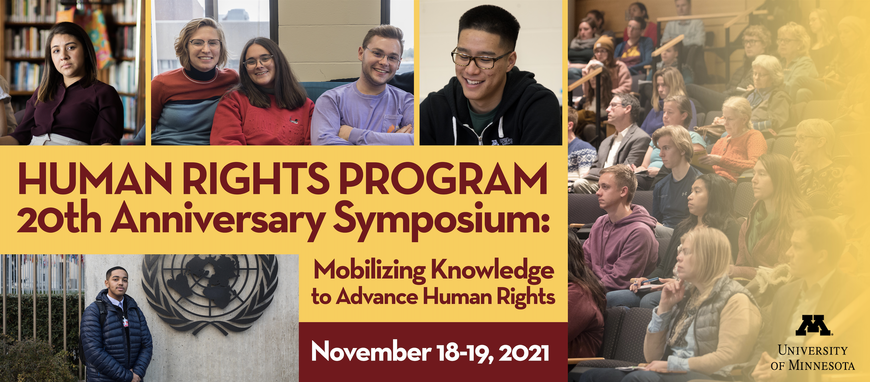Human Rights Program 20th Anniversary Symposium
301 19th Ave S
Minneapolis,
MN
55455
The Human Rights Program celebrates its 20th anniversary this year. To mark the occasion, we are hosting the Human Rights Program 20th Anniversary Symposium: Mobilizing Knowledge to Advance Human Rights on November 18 - 19, 2021, in Cowles Auditorium at the Humphrey School of Public Affairs on the University Twin Cities campus.
The two-day event features a keynote address on the role of universities in advancing human rights by an Office of the United Nations High Commissioner for Human Rights (UN OHCHR) representative, a showcase of UMN faculty-led engaged scholarship, a film screening of Until We Find Them, conversations with Mexico-based journalists and researchers working to address disappearances in Latin America, presentations by a student team researching human rights defenders, and the launch of Program Director Barbara Frey's newest book, Disappearances in the Post-Transition Era in Latin America.
Join us in celebration as we highlight the many affiliated faculty, students, and practitioners engaging in human rights research, teaching, and engagement—the three pillars of the program’s work.
Symposium Schedule for Thursday, November 18, 2021
Engaged Scholarship Showcase
Welcome & Opening Remarks
1:00 - 1:15 PM
- Malinda Lindquist, associate dean of Diversity, Equity, and Inclusion in the College of Liberal Arts, UMN
- Barbara Frey, director of the Human Rights Program, UMN
Arts & Human Rights
1:15 - 2:30 PM
The struggle for human rights has always found expression in the arts -- through visual and performative representations and literary voice. Art has a complex relationship with human rights; it can be used to drive divisions among people, but it is also central to advocacy, memory, and reconciliation.
How do the arts help us to understand the causes and consequences of human rights violations? What is the role of arts in driving activism, in expressing the complex truths of victims, and in moving communities towards justice and reparations? What new artistic visions are on the horizon?
- Osiris Gómez, assistant professor of Spanish & Portuguese studies, UMN
- V. V. Ganeshananthan, assistant professor of creative writing, English, UMN
- Sonja Kuftinec, professor of theatre arts & dance, UMN
- Lisa Hilbink (moderator), professor of political science, UMN
Education & Human Rights
2:45 - 4:00 PM
International human rights law recognizes the right of all children to access quality education without discrimination. The global pandemic has underscored the importance of education in social development and cohesion while at the same time shining light on many of the weaknesses in our educational systems. Faculty and graduate students at the University of Minnesota are deeply involved in building access to quality education globally and locally.
What needs to be done to reduce disparities in formal education in the near and far term? What educational approaches are best suited to counter-balancing false narratives that contribute to human rights violations? Should there be more human rights content in formal education? What have we learned from informal strategies about effective human rights teaching?
- Michael Winikoff, director of the Science Communication Lab, UMN
- Deborah Jane, outreach coordinator, Institute for Global Studies, UMN
- Shonni Krengel, Master of Human Rights graduate student, UMN
- Joan DeJaeghere, professor of organizational leadership, policy & development, UMN
- Sheer Ganor (moderator), assistant professor of history, UMN
Human Rights at Home
4:15 - 5:30 PM
The human rights movement, with its global scope, is increasingly highlighting the issues endemic to the United States. The need for action to promote equality, dignity and fairness has been acutely visible in an era of authoritarianism built upon animosity toward BIPOC communities and immigrants. Faculty and graduate students at the University of Minnesota are carrying out engaged research on human rights, from immigration courts to health care providers.
How can the human rights framework be used most effectively to document and to confront violations in the US? How can the academy contribute to the advancement of human rights in our own communities? What are the social, political and discursive challenges of making human rights claims in the US and how might we overcome those challenges?
- Jack DeWaard, associate professor of sociology, UMN
- Linus Chan, associate professor of clinical law, UMN
- Audrey Dorélien, assistant professor of global policy and social policy, Humphrey School of Public Affairs, UMN
- Carolyn Liebler, associate professor of sociology, UMN
- Cosette Creamer (moderator), assistant professor of political science, UMN
“Principled Voices”: A Stephen and Chacke Scallen Lecture in Human Rights (in person ONLY)
7:00 - 8:30 PM
The 2021 Scallen Lecture presents Darwin Franco and Dalia Souza, investigative journalists from Guadalajara, México, who have documented the crisis of disappearance that is playing out across their country. Their work as reporters for ZonaDocs uncovers and explains the brutal violence that is destroying the fabric of communities in Mexico.
Hunter Johnson (MHR ‘19) highlighted the reporting work of Franco and Souza in Until We Find Them, an award winning documentary about the crisis of enforced disappearances. A screening of the documentary will be followed by an interview with the journalists.
- Darwin Franco, journalist, general coordinator of ZonaDocs
- Dalia Souza, journalist, head of information and editor of ZonaDocs
- Hunter Johnson (MHR '20), documentary filmmaker and photographer
Schedule for Friday, November 19
Symposium Supporters
Co-sponsors: Binger Center for New Americans, Center for Global Health & Social Responsibility, Center for Holocaust & Genocide Studies, Center on Women, Gender, & Public Policy, Department of History, Humphrey School of Public Affairs, Human Rights Center, Immigration History Research Center, Institute for Global Studies, Interdisciplinary Center for the Study of Global Change, Department of Political Science, Department of Sociology, Department of Spanish & Portuguese Studies.
Additional support provided through an International Title VI Grant from the US Department of Education; the Ohanessian Fund for Justice and Peace Studies of the Minneapolis Foundation; and the Stephen & Chacke Scallen Lecture in Human Rights Fund.
Contact
Contact Rochelle Hammer at hamm0229@umn.edu or 612-626-7947 with questions.
